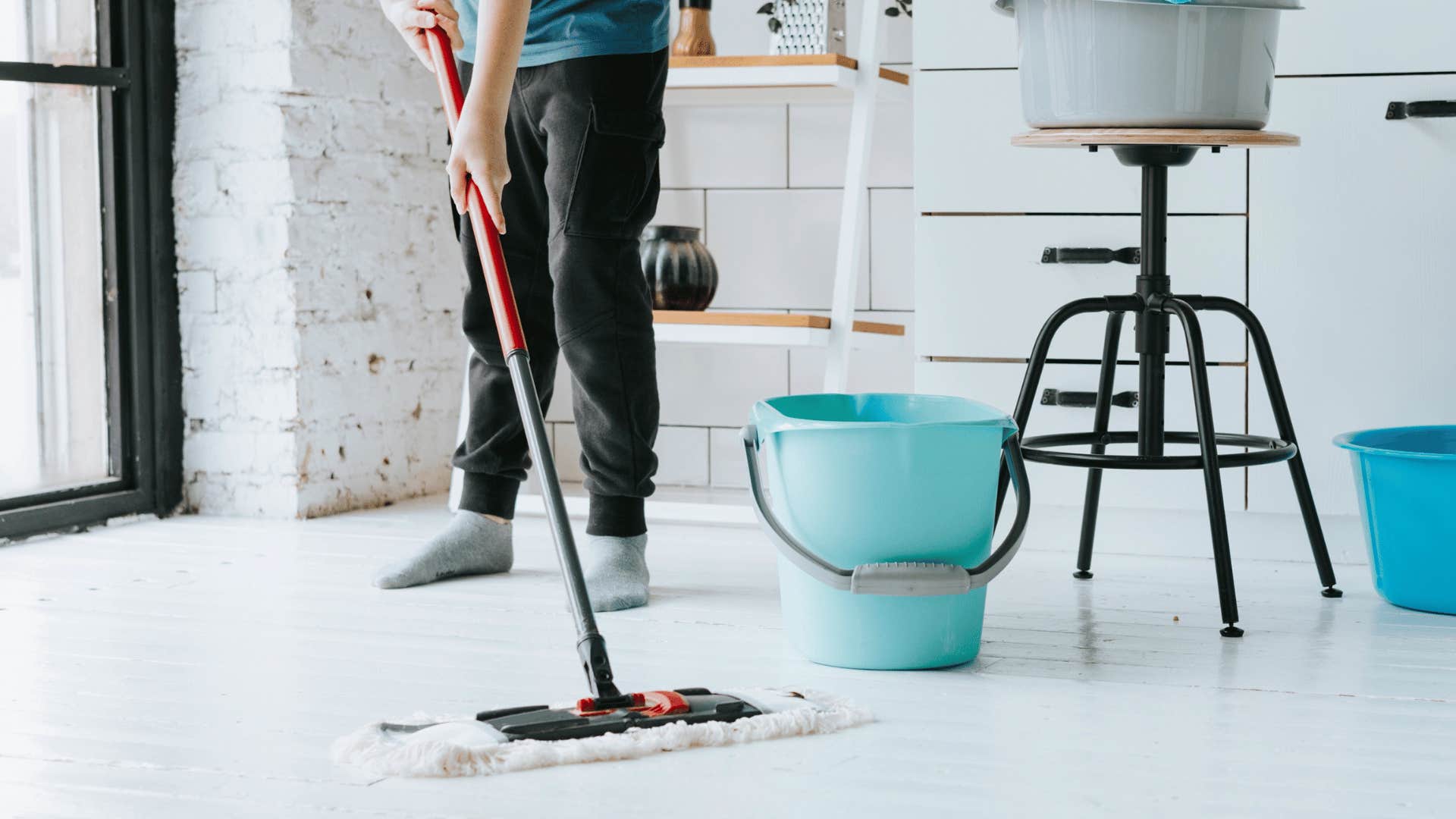8 Tricks That Will Instantly Get You Moving If You're Struggling To Get Off The Couch, According To Psychology
Get up and get moving — and better your mood while you're at it.
 Andrej Lišakov | Unsplash
Andrej Lišakov | Unsplash In my twenties, I was frequently lost and overwhelmed. Still can be today. I thought I had to mold myself to the world because the world seemed big and scary and had all the answers. It turns out that writing down my struggles and extracting the solutions from my surprisingly bright little mind helped. A lot. Just like it will for you, this is just one example of how there’s more we can do right here right now from a place of inner faith to bring us surprising benefits.
Here are 8 tricks that will instantly get you moving if you're struggling to get off the couch:
1. Decide to create something, even if it's small
 PeopleImages.com – Yuri A | Shutterstock
PeopleImages.com – Yuri A | Shutterstock
Many of us fuss and fight, worrying about ourselves and our place in the world. We’re completely oblivious to the fact others exist and need our help.
There’s much you can do today — from sharing an encouraging tweet to taking a small step to designing a small creativity workshop — that takes the burning light off you and out towards creating good in the world. Even deciding to help will shift your aura.
Research published in 2022 by Frontiers in Psychology shows that actively enhancing others' lives through prosocial behavior, like acts of kindness and helping others, has a significant positive impact on the helper's well-being, often leading to increased happiness, reduced stress, and a stronger sense of social connection. This phenomenon is often referred to as the "helper's high" and is supported by studies exploring the psychology of altruism and empathy.
2. Set the timer for 10 minutes and tidy
 KlavdiyaV | Shutterstock
KlavdiyaV | Shutterstock
Dedicating just ten minutes to tidying up will reduce stress and make you feel better. Declutter. Clean the kitchen sink. Deal with the horrors lurking under your bed. Small things create big benefits.
Research referenced by Stanford University suggests that performing a quick tidy can significantly improve mental well-being by reducing stress, enhancing focus, and boosting feelings of accomplishment, mainly due to the sense of control and order achieved by decluttering and organizing one's space. A clean environment is often linked to positive emotions and improved mood, while clutter can contribute to feelings of overwhelm and anxiety.
3. Remove social media apps from your phone
 PeopleImages.com – Yuri A | Shutterstock
PeopleImages.com – Yuri A | Shutterstock
So many of us are burned out because of overexposure to these man-made things. We say we’ve ‘cured boredom,’ but brains are fried from the stimulation of online entertainment.
The trick to reclaiming natural energy is to starve our senses of these things for a few hours a day. Try this and watch your dopamine receptors grow back, filling your day with color once more.
4. Try transmutation journaling
 Monstera Production | Pexels
Monstera Production | Pexels
Small habits like this one can make a profound difference. While most people are grinding through the day on a foundation of cyclical worry and pent-up emotions, you found the release hatch.
Journal on your main problems or worries and write through to solutions. You’ll be surprised at your ingenuity and the relief this brings.
Research from The University of California at Berkeley showed that journaling could provide a range of mental health benefits, including reduced stress, improved emotional regulation, increased self-awareness, better-coping mechanisms, and even potential physical health improvements by helping individuals process and understand their emotions, mainly when writing about stressful or traumatic experiences. Some studies demonstrate that regular journaling can lower blood pressure and improve immune function.
5. Embrace the 4–7–8 breathing technique
 Miljan Zivkovic | Shutterstock
Miljan Zivkovic | Shutterstock
Breathe in for four seconds. Hold for seven seconds. And then breathe out for eight seconds. Repeat. This simple exercise will slow your frenetic mind, bringing calm and creativity.
Research published in 2023 by Frontiers in Psychology showed that various breathing techniques, prolonged and deep breathing exercises, can effectively reduce stress and anxiety and improve overall well-being by influencing the autonomic nervous system, with benefits including lowered blood pressure, increased heart rate variability, and enhanced relaxation response. Studies often highlight techniques like paced, diaphragmatic, and box breathing to achieve these outcomes.
6. Expose yourself to sunlight every morning
 Ivan Berrocal | Shutterstock
Ivan Berrocal | Shutterstock
We’re not automatons. Just because technology is advancing doesn’t mean our needs as humans have changed that much at all.
Swap eating sugary cereal for a 10–15 min walk outside in the daylight at the very least (I know, eh, you Canadians may struggle with this, but do what you can). Sunlight exposure in the morning will boost your mood (Vitamin D, anyone?) and regulate your circadian rhythm.
Research has shown that exposure to morning sunlight significantly improves sleep quality by regulating the body's circadian rhythm, leading to better sleep onset, increased sleep duration, and reduced sleep fragmentation. It can also positively impact mood, cognitive function, and potentially even weight management by influencing hormone levels like melatonin and leptin, according to a 2022 study published by the Journal of Sleep Research.
7. Quiet your mind for 10 minutes
 Alliance Images | Shutterstock
Alliance Images | Shutterstock
Niksen is the Dutch art of literally doing nothing, with no sense of purpose, to reduce stress and increase productivity. You can’t be on all the time. Do nothing so you make something of yourself. Have fun with this. Be overtly committed to unadulterated laziness.
8. Attempt a micro-workout
 Vlada Karpovich | Pexels
Vlada Karpovich | Pexels
Who said you needed to go to the gym to benefit from the endorphin rush that comes from moving that body of yours? Do ten press-ups between writing sessions with a devilish glint in your eye. How to boost your mood in the next five minutes? 15 squats ought to do it.
A 2023 study by the Pacific Neuroscience Institute’s Brain Health Center showed that regular exercise can significantly benefit brain health by improving memory cognitive function, reducing the risk of cognitive decline, and potentially delaying the onset of neurodegenerative diseases like Alzheimer's, with evidence indicating that even moderate physical activity can have positive effects on the brain across different age groups. Researchers at the University of British Columbia found that regular aerobic exercise significantly increased the size of the hippocampus, a brain area critical for memory consolidation.
9. Repeat to yourself: One task at a time
 Vlada Karpovich | Pexels
Vlada Karpovich | Pexels
Ever notice all the distractions you allow to permeate into your work environment? Try going fully distraction-free in whatever you’re doing.
Indulge in the beauty of being present with your next task. No pings. No unannounced visits. One task at a time. Total, unmitigated presence makes any task fun. Try it.
Concentration shields against distraction because undesired background processing is reduced, and the locus of attention becomes more steadfast. We believe these two mechanisms are separable. The former is associated with active suppression or inhibition of distraction, and the latter with distracter blocking because of the excellent facilitation of attention to the attended stimulus, according to a 2015 study.
Alex Mathers is a writer and coach who helps you build a money-making personal brand with your knowledge and skills while staying mentally resilient.

